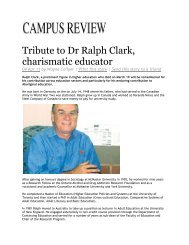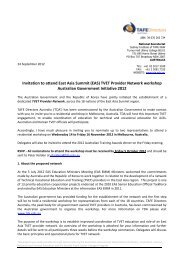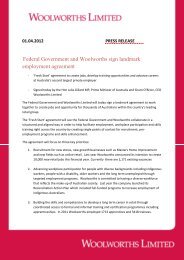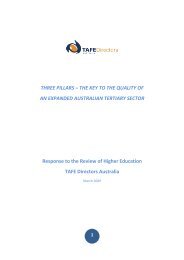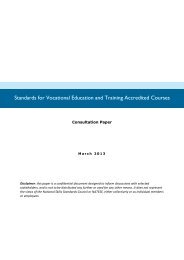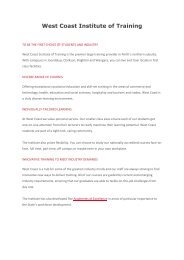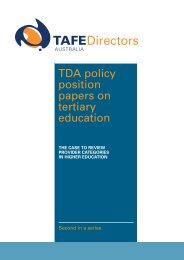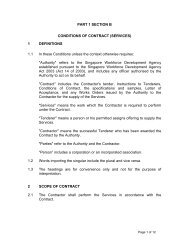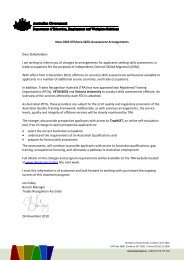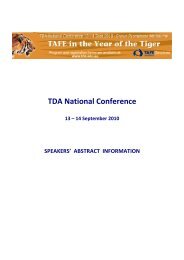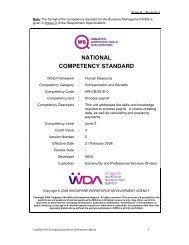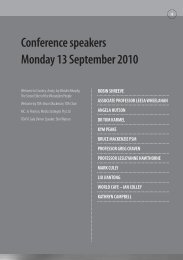Opportunities and Challenges for UK Further Education, by Pam ...
Opportunities and Challenges for UK Further Education, by Pam ...
Opportunities and Challenges for UK Further Education, by Pam ...
You also want an ePaper? Increase the reach of your titles
YUMPU automatically turns print PDFs into web optimized ePapers that Google loves.
Title: <strong>Opportunities</strong> <strong>and</strong> <strong>Challenges</strong> <strong>for</strong> <strong>UK</strong> <strong>Further</strong> <strong>Education</strong><br />
Name:<br />
<strong>Pam</strong> Caven: Director Policy <strong>and</strong> Stakeholder Engagement, National Secretariat, TDA<br />
pcaven@tda.edu.au<br />
Bionotes:<br />
<strong>Pam</strong> Caven took up the position of Director Policy <strong>and</strong> Stakeholder Engagement, TAFE<br />
Directors Australia (TDA), in May 2007.<br />
<strong>Pam</strong>’s career has included being a secondary school teacher, teachers’ college lecturer,<br />
TAFE teacher, senior manager in State <strong>and</strong> Federal Government departments, <strong>and</strong> author.<br />
She was a Director in the Victorian Department of <strong>Education</strong> <strong>and</strong> Training prior to moving to<br />
the Australian National Training Authority (ANTA) as Project Director. Post ANTA, <strong>Pam</strong><br />
managed a variety of projects <strong>and</strong> was engaged as an audit consultant <strong>by</strong> the Victorian<br />
Auditor General. At TDA, <strong>Pam</strong> has drawn on input from members to develop <strong>for</strong>mal TDA<br />
submissions to a range of government <strong>and</strong> departmental enquiries <strong>and</strong> consultations. She<br />
has managed significant national projects <strong>and</strong> organised a range of seminars <strong>and</strong> the annual<br />
TDA national conferences.<br />
<strong>Pam</strong> holds a BA (Hons), Dip Ed, Cert.IV (Training & Assessment) <strong>and</strong> a Masters degree in<br />
<strong>Education</strong> – Leadership <strong>and</strong> Management.<br />
TDA/LH Martin <strong>UK</strong> Study Trip: Higher <strong>Education</strong> in <strong>Further</strong> <strong>Education</strong> (FE)<br />
<strong>Pam</strong> Caven, Director Policy <strong>and</strong> Stakeholder Engagement, TAFE Directors Australia (TDA)<br />
<strong>and</strong> Associate Professor Leesa Wheelahan, LH Martin Institute, University of Melbourne,<br />
spent over two weeks travelling in Engl<strong>and</strong> <strong>and</strong> Scotl<strong>and</strong>, including London, Plymouth,<br />
Bristol, York, Durham <strong>and</strong> Glasgow in June-July 2011. In the course of this trip, discussions<br />
were held with a wide variety of key in<strong>for</strong>mants from universities, <strong>Further</strong> <strong>Education</strong> (FE)<br />
Colleges (principals, senior managers, coordinators <strong>and</strong> teachers), officials from government<br />
agencies <strong>and</strong> statutory bodies including the Higher <strong>Education</strong> Funding Council <strong>for</strong> Engl<strong>and</strong><br />
(HEFCE), the Department <strong>for</strong> Business Innovation <strong>and</strong> Skills (BIS), Foundation Degrees<br />
Forward, the Institute <strong>for</strong> Learning, <strong>and</strong> the Higher <strong>Education</strong> Academy (HEA) in Engl<strong>and</strong>,<br />
<strong>and</strong> Skills Development Scotl<strong>and</strong>. Meetings <strong>and</strong> discussions were also held with the<br />
Association of Colleges in Engl<strong>and</strong> <strong>and</strong> Scotl<strong>and</strong>’s Colleges which are the sister<br />
organisations of TDA, <strong>and</strong> with the Mixed Economy Group which represents FE Colleges in<br />
Engl<strong>and</strong> that have a substantial component of higher education load.<br />
Both Associate Professor Leesa Wheelahan <strong>and</strong> I presented papers on Higher <strong>Education</strong> in<br />
FE in Australia at a lively session in London, hosted <strong>by</strong> the Association of Colleges. The<br />
1
willingness of <strong>UK</strong> colleagues to both share insights <strong>and</strong> provide hospitality was both<br />
impressive <strong>and</strong> generous.<br />
This <strong>UK</strong> trip coincided with a period of considerable flux <strong>for</strong> the <strong>UK</strong> further education system<br />
– a period of recovery from the GFC with the Coalition Government implementing measures<br />
to curtail government spending. The priorities <strong>and</strong> directions of the Government were<br />
articulated in the White Paper, Students at the Heart of the System, published in late June<br />
2011.<br />
It is a period of opportunities <strong>and</strong> challenges <strong>for</strong> FE Colleges.<br />
Purpose of the Study Trip<br />
Overall, the purpose of the trip was to build collaborative networks <strong>and</strong> enhance LH<br />
Martin/TDA’s underst<strong>and</strong>ing of the policy <strong>and</strong> operational implications of <strong>Further</strong> <strong>Education</strong><br />
Colleges delivering Higher <strong>Education</strong> in the <strong>UK</strong>, in particular:<br />
• to gain insight into the English <strong>and</strong> Scottish systems <strong>and</strong> specifically, the extent of<br />
Higher <strong>Education</strong> in FE, how it is funded <strong>and</strong> how it is administered <strong>and</strong> to consider the<br />
implications <strong>for</strong> Australia<br />
• to examine the policy implications of Higher <strong>Education</strong> in FE, particularly in relation to<br />
issues of governance, quality assurance, academic st<strong>and</strong>ards, staff development,<br />
student support <strong>and</strong> IR<br />
• to document <strong>UK</strong> definitions of Scholarship as an essential component of the delivery<br />
<strong>and</strong> assessment of Higher <strong>Education</strong> in FE – a particular focus of the TDA Board<br />
• to consider <strong>UK</strong> institutional partnerships, strategies <strong>and</strong> programs<br />
• to develop networks with a view to international collaboration, further study tours <strong>and</strong><br />
professional development opportunities/staff exchange between the <strong>UK</strong> <strong>and</strong> Australia.<br />
Background<br />
In Australia, <strong>and</strong> similarly in the <strong>UK</strong>, government policies, the economic environment <strong>and</strong><br />
industry practices are providing the impetus <strong>for</strong> an increasing number of people to seek<br />
higher level qualifications, particularly higher education qualifications.<br />
The mid-level technical, para-professional <strong>and</strong> professional occupations <strong>for</strong> which TAFE<br />
institutes have traditionally provided training increasingly require or expect higher education<br />
qualifications <strong>for</strong> entry to the occupation or <strong>for</strong> career progression.<br />
The Bradley Review acknowledged the emergence of a more diverse tertiary sector. TDA<br />
responded to the Review’s recommendations in the Blueprint <strong>for</strong> Australia’s Tertiary<br />
<strong>Education</strong> Sector, published in July 2010.<br />
2
Since that date, there have been further changes in the Australian higher education policy<br />
l<strong>and</strong>scape: The Australian Government’s decision to uncap undergraduate places at<br />
universities from 2012; the endorsement of the Australian Qualifications Framework <strong>and</strong> the<br />
establishment of new regulatory arrangements <strong>for</strong> vocational education <strong>and</strong> training <strong>and</strong> <strong>for</strong><br />
higher education.<br />
Australian Governments are clearly supporting a market-based approach to the provision of<br />
both vocational <strong>and</strong> higher education.<br />
TAFE institutes in Australia <strong>and</strong> FE Colleges in the <strong>UK</strong>, traditionally the primary providers of<br />
vocational education <strong>and</strong> training, are responding to this changing educational l<strong>and</strong>scape <strong>by</strong><br />
increasingly offering higher education qualifications in their own right or in partnership with<br />
universities. 1<br />
Relationships between TAFE institutes <strong>and</strong> universities will involve competition <strong>and</strong><br />
cooperation, although different TAFE institutes may emphasise one or the other in their<br />
relationships with universities. Rather than this movement of TAFE institutes into the<br />
provision of higher education programs being seen as competing with universities, it is likely<br />
that universities in Australia, particularly the recruiting universities, will want to <strong>for</strong>m more<br />
linkages with TAFE institutes to increase their share of Commonwealth Supported Places<br />
<strong>and</strong> guarantee a pipeline of students. Those TAFE institutes that offer higher education<br />
qualifications in their own right will continue to develop their provision <strong>and</strong> participate in the<br />
tertiary education market <strong>for</strong> students <strong>for</strong> degrees, <strong>and</strong> also <strong>for</strong>m partnerships with<br />
universities where this is mutually beneficial.<br />
The offering of more higher education qualifications has also brought challenges to TAFE<br />
institutes; in the partnerships that TAFE institutes <strong>for</strong>m, their academic governance<br />
arrangements <strong>and</strong> the quality of their higher education delivery <strong>and</strong> assessment. A<br />
consistent theme in Australian Universities Quality Agency (AUQA) reviews of Higher<br />
<strong>Education</strong> offered <strong>by</strong> TAFE institutes has been the need <strong>for</strong> a better appreciation of what is<br />
meant <strong>by</strong> scholarship <strong>and</strong> <strong>for</strong> more underst<strong>and</strong>ing of the importance <strong>and</strong> value of higher<br />
education governance arrangements.<br />
In many respects, TAFE institutes in Australia have a number of issues in common with FE<br />
Colleges delivering Higher <strong>Education</strong> in the <strong>UK</strong>.<br />
<strong>Further</strong> <strong>Education</strong> in Higher <strong>Education</strong> in the <strong>UK</strong><br />
The <strong>UK</strong> higher education in FE l<strong>and</strong>scape is complex with a variety of institutions <strong>and</strong><br />
agencies delivering <strong>and</strong> accrediting vocational education <strong>and</strong> training, further education <strong>and</strong><br />
higher education qualifications.<br />
FE Colleges have an important role to play in the provision of Higher <strong>Education</strong> in the <strong>UK</strong>.<br />
They offer approximately 10% of the delivery in Engl<strong>and</strong>. 2 Scotl<strong>and</strong>’s FE Colleges deliver<br />
about 25% of higher education undergraduate student load (depending on how this is<br />
3
calculated). 3 Some English FE Colleges have a considerably higher education load, most<br />
notably the Mixed Economy Group of Colleges (40 of 340).<br />
Three hundred <strong>and</strong> <strong>for</strong>ty-seven FE Colleges in Engl<strong>and</strong> were incorporated in 1992. 4 They<br />
deliver to 16-19 year olds undertaking secondary school certificates (a major student cohort<br />
<strong>for</strong> FE Colleges in contrast to TAFE institutes); to students undertaking a range of vocational<br />
qualifications – NVQs (which are the equivalent of training packages) <strong>and</strong> apprenticeships<br />
(although the latter in much smaller numbers than in Australia). FE Colleges also offer<br />
Higher National Certificates (HNCs) <strong>and</strong> Higher National Diplomas (HNDs). These national<br />
qualifications have a long history in the <strong>UK</strong>.<br />
FE Colleges have an enviable success rate of 81% retention <strong>and</strong> 65% were judged <strong>by</strong> the<br />
Quality Assurance Agency to be good or outst<strong>and</strong>ing. 5<br />
Scottish Colleges have recently embarked on a rationalisation <strong>and</strong> modernisation of their<br />
HNCs <strong>and</strong> HNDs.<br />
The greatest growth in higher education in further education in Engl<strong>and</strong> has been in<br />
Foundation Degrees. These are offered <strong>by</strong> universities <strong>and</strong> FE Colleges, although not in<br />
Scotl<strong>and</strong>. Scottish colleagues were of the opinion that HNCs <strong>and</strong> HNDs are well understood<br />
<strong>by</strong> the community, employers <strong>and</strong> students. Scottish HNCs <strong>and</strong> HNDs are accredited <strong>by</strong><br />
government accreditation bodies <strong>and</strong>, unlike Foundation Degrees, do not need to be<br />
validated <strong>by</strong> universities. Scottish FE Colleges argue this gives colleges the independence<br />
they need to develop locally responsive education qualifications.<br />
Foundation Degrees were largely an initiative of the <strong>for</strong>mer Labour Government. While their<br />
original purpose may have been to provide a higher education pathway <strong>for</strong> existing workers<br />
<strong>and</strong> part-time students, it would appear that they have morphed over time into transition<br />
qualifications <strong>for</strong> exiting secondary students <strong>and</strong> <strong>for</strong> mature-aged students who wish to enter<br />
higher education. They became part of the <strong>for</strong>mer <strong>UK</strong> Government’s strategy <strong>for</strong> widening<br />
access into higher education, especially <strong>for</strong> students from low SES backgrounds. FE<br />
Colleges currently supply 38% of higher education entrants. 6<br />
‘All Foundation Degrees have to meet two crucial benchmarks: employer involvement in<br />
curriculum <strong>and</strong> delivery <strong>and</strong> workplace delivery’ (Susan Hayday, Director of Workplace<br />
Learning Strategy, Foundation Degrees Forward). Their focus is on local industry <strong>and</strong><br />
vocational relevance, although there is some tension between their vocational orientation<br />
<strong>and</strong> the objective of widening access. There is a plethora of these degrees throughout<br />
Engl<strong>and</strong>, some would argue potentially causing confusion to employers. 7<br />
Foundation Degrees are not just the first two years of a degree; they are designed to have a<br />
specific vocational outcome <strong>and</strong> support student transition to a full degree. This is in contrast<br />
with Australia especially via franchising arrangements under which universities determine<br />
the courses of their partner institutes.<br />
4
Despite their popularity the future expansion of Foundation Degrees in Engl<strong>and</strong> is unclear.<br />
They are seen to be a Labour Party initiative, not wholeheartedly embraced <strong>by</strong> the Coalition<br />
Government.<br />
The larger picture however of the Coalition Government’s changes to the funding of<br />
universities is a mixed one – there appear to be both opportunities <strong>and</strong> challenges <strong>for</strong> FE<br />
Colleges in this more competitive marketplace. FE Colleges are looking at how they can tap<br />
into the additional 20,000 places that the Coalition Government has allocated <strong>for</strong> fees lower<br />
than GBP7500.<br />
The Association of Colleges warned, prior to the White Paper, that a more competitive<br />
marketplace <strong>for</strong> higher education students may play out badly <strong>for</strong> FE Colleges. The<br />
Association pointed to some validating universities withdrawing from their relationships with<br />
colleges. There was some evidence of a growth in teacher redundancies. 8<br />
On the other side of the ledger, as many English universities signal their intention to charge<br />
the maximum allowed GBP9,000, some FE Colleges are taking a different approach. New<br />
College Durham, an FE College, currently has about 1,500 students doing higher education<br />
courses <strong>and</strong> plans to pitch its fee <strong>for</strong> degree courses at GBP6,000. Like many FE Colleges,<br />
it hopes to gain from the expansion of places <strong>for</strong> institutions with an average fee of<br />
GBP7,500 or less. The principal, John Widdowson, welcomed the changes announced in the<br />
White Paper, ‘The ability to offer additional places is really welcome. There is dem<strong>and</strong> from<br />
people who want to study locally <strong>and</strong> do vocational qualifications. [Colleges] will fill these<br />
20,000 places pretty quickly <strong>and</strong> still find unmet dem<strong>and</strong>’. 9<br />
FE Colleges it would seem will charge lower fees <strong>and</strong> potentially attract more students but<br />
they do this in a time when the <strong>UK</strong> Government is imposing cuts to public funding, <strong>for</strong><br />
example, in education infrastructure <strong>and</strong> places. The Government is also encouraging<br />
greater competition that will come from existing <strong>for</strong>-profit providers <strong>and</strong> also from global<br />
competitors (Pearson, Apollo Group <strong>and</strong> Kaplan are just a few of the world’s leading<br />
education companies).<br />
Partnerships with universities<br />
Many of the tensions Australia experiences between TAFE institutes <strong>and</strong> universities in<br />
developing partnerships <strong>and</strong> competing in the market are evident in the <strong>UK</strong>.<br />
Some provision in FE Colleges is directly funded <strong>by</strong> Government but most is routed through<br />
universities in franchises <strong>and</strong> partnerships. Even where directly funded to deliver higher<br />
education, FE Colleges must still rely on university partners to validate their higher education<br />
qualifications.<br />
Some ‘mixed economy’ FE Colleges are seeking self-accrediting status <strong>for</strong> their own<br />
foundation degrees through the Privy Council. This is the preferred position of FE Colleges,<br />
5
as some (particularly the Mixed Economy Group [MEG]) feel that they are otherwise required<br />
to fit into the ‘university mould’ of higher education qualifications <strong>and</strong> participate in often<br />
prolonged validation processes.<br />
Partnership arrangements between universities <strong>and</strong> FE Colleges exist on a continuum:<br />
franchising arrangements are at one end, which often involve little support or interaction<br />
between the university <strong>and</strong> FE College <strong>and</strong> at the other end, true partnerships, in which the<br />
university helps to build capacity in their partner FE Colleges <strong>and</strong> provide resources <strong>and</strong><br />
support to teachers <strong>and</strong> students.<br />
The concept of scholarship<br />
Members of the Board of TDA requested that one of the issues to be pursued in the <strong>UK</strong> was<br />
scholarship. The sub-text was to investigate how FE Colleges prepared their higher<br />
education students to make a successful transition to study at university. What was the<br />
underst<strong>and</strong>ing of scholarship in FE Colleges in partnership with universities? What<br />
arrangements did the Colleges/the partner universities have in place to foster <strong>and</strong> develop<br />
scholarly behaviour <strong>and</strong> activity?<br />
As in Australia, there was ongoing interest <strong>and</strong> lively discussion on the topic in the <strong>UK</strong>. Our<br />
<strong>UK</strong> colleagues certainly felt that there was a need to go beyond a narrow definition of<br />
scholarly behaviour as being engaged in research <strong>and</strong> publication. While there was a<br />
multiplicity of views, there was broad support <strong>for</strong> Ernest L Boyer’s report, Scholarship<br />
Reconsidered 10 with its exposition of the ‘scholarships of discovery, integration, application<br />
<strong>and</strong> teaching’.<br />
There was also general agreement that all students undertaking higher education study<br />
needed to develop cognitive, critical <strong>and</strong> analytical skills.<br />
FE Colleges have adopted a range of strategies to promote scholarship <strong>for</strong> further education<br />
in higher education staff <strong>and</strong> students.<br />
Case study: The University of Plymouth Colleges Faculty – “Like the Roman Empire”<br />
The University of Plymouth Colleges Faculty has a thoroughgoing approach to promoting<br />
quality <strong>and</strong> scholarship in their delivery of their Foundation Degrees. The Faculty works with<br />
19 partners (the majority are FE Colleges) in a large geographical area, stretching from<br />
Bristol to Penzance. This is the largest partnership in the <strong>UK</strong> with 10,500 students (one-third<br />
of the university population). The University validates all courses <strong>and</strong> awards the<br />
qualifications offered with its partner FE colleges.<br />
The Faculty also recognises the differences between university disciplines <strong>and</strong> academic<br />
faculties <strong>and</strong>, like the Roman Empire, deals with its component parts differently.<br />
6
All staff who teach further education in FE partner Colleges are registered university staff<br />
<strong>and</strong> have access to all university facilities, although the university is not their employer. The<br />
Dean of the Faculty, Dr Colin Williams, maintains that the focus of the Faculty needs to be<br />
on the students – staff need to adjust to a variety of learning styles. Many of the students<br />
come from low SES backgrounds <strong>and</strong> would not previously have aspired to or had the<br />
support to go to university.<br />
Dr Williams <strong>and</strong> the staff in the Faculty are keen to foster an academic community across<br />
the University that supports scholarship in staff <strong>and</strong> students via:<br />
• academic liaison staff from university faculties working with colleges at a subject level,<br />
recognising the differences between disciplines<br />
• Subject Forum Chairs as a bridge between the FE Colleges <strong>and</strong> the university faculties<br />
• an annual Conference, <strong>for</strong> example, in the Liberal Arts. (This year the Conference had a<br />
focus on censorship.)<br />
• master classes <strong>for</strong> all higher education teaching staff at partner colleges<br />
• seminars on topics such as copyright<br />
• external examinations.<br />
The elaborate quality assurance <strong>and</strong> administrative structures of the Faculty are not<br />
necessarily replicated in other college/university partnerships. In many cases it is understood<br />
that the validating university will visit a college once a year <strong>and</strong> if they are unhappy with what<br />
they see, will commission an independent reviewer.<br />
Case study 2: The Higher <strong>Education</strong> Academy (HEA)<br />
The Higher <strong>Education</strong> Academy (HEA) in many senses per<strong>for</strong>ms a similar function to the<br />
Australian Learning <strong>and</strong> Teaching <strong>and</strong> Learning Council (ALTC), whose functions will<br />
transfer to the Department of <strong>Education</strong>, Employment <strong>and</strong> Workplace Relations (DEEWR).<br />
HEA works with College principals, university academics <strong>and</strong> further education staff to<br />
establish a range of strategies to support FE College staff in attaining the underst<strong>and</strong>ing <strong>and</strong><br />
skills to engage their students in scholarly activities, including workshops on assessment;<br />
experiential learning; exploration of pedagogy <strong>for</strong> higher education in further education; a<br />
scholarly activity webpage print <strong>and</strong> soft copies of resources; <strong>and</strong> webinair facilities <strong>for</strong><br />
further education staff.<br />
Case study 3: New College Durham – “It’s about the language”<br />
John Widdowson, Principal of New College Durham <strong>and</strong> convener of the Mixed Economy<br />
Group, frames the debate around scholarship in terms that emphasise the ‘applied’ nature of<br />
higher education as offered <strong>by</strong> FE Colleges. While he supports higher education students<br />
7
acquiring ‘critical professional practice’, bringing together skills <strong>and</strong> academia, he believes<br />
that some academic behaviour is designed to exclude low SES students.<br />
Some of the strategies New College Durham staff use to ensure that students are being<br />
prepared <strong>for</strong> transition to university include the availability of personal <strong>and</strong> professional<br />
development units (subjects or modules); an academic librarian working with students on<br />
assignments <strong>and</strong> moderation between teachers.<br />
Staff at New College Durham maintained that retention is very high in their higher education<br />
in further education courses <strong>and</strong> students are adequately prepared <strong>for</strong> transition.<br />
Staff acknowledged, however, that the Quality Assurance Agency (QAA) has observed that<br />
FE Colleges overall are not systematic enough in reflecting <strong>and</strong> recording what the staff are<br />
doing <strong>and</strong> there<strong>for</strong>e are not sufficiently strategic.<br />
Supporting regional economic development<br />
In Engl<strong>and</strong>, there is considerable focus on local development of programs, especially via<br />
Foundation Degrees. It is argued that there are gains in regional arrangements that raise the<br />
levels of skills in a region via retaining people in the region there<strong>by</strong> creating a bank of<br />
graduates that may attract industry to the region (University of Plymouth Faculty<br />
perspective).<br />
Australian Governments have indicated that TAFE institutes will play an important role in<br />
increasing access to higher education in regions; however, there has been less discussion<br />
about the way higher education in TAFE institutes can support regional economic<br />
development.<br />
The implications <strong>for</strong> Australia are that it would appear that new higher education<br />
qualifications that are in response to local dem<strong>and</strong>s <strong>and</strong> requirements will need to be<br />
developed, in contrast to just taking the first two years of existing ‘generic’ degrees at<br />
universities <strong>and</strong> arranging <strong>for</strong> them to be delivered <strong>by</strong> the TAFE institutes in the regions.<br />
Building capacity<br />
The <strong>UK</strong> Government requires further education teachers to be registered, to have teaching<br />
qualifications, <strong>and</strong> to document their annual Continuous Professional Development Program,<br />
although this is not required if they exclusively teach only higher education programs.<br />
The <strong>UK</strong> Government has, in the past, also funded consortia arrangements that are premised<br />
on a university working with a number of different further education partners to build the FE<br />
College’s capacity to offer higher education. A number of these consortia have remained<br />
even after initial funding ceased.<br />
8
The research funding bodies have also funded extensive research into higher education in<br />
further education. Some of the strategies employed <strong>by</strong> Colleges have been examined under<br />
the section on scholarship.<br />
The implication <strong>for</strong> Australia is that it would be beneficial if the Australian Government placed<br />
a greater focus on building capacity of higher education teachers in Australian TAFE<br />
institutes <strong>and</strong> in helping build capacity <strong>for</strong> academic governance in TAFE institutes more<br />
broadly.<br />
Governance<br />
FE Colleges offering Higher <strong>Education</strong> are required to have appropriate academic<br />
governance, that is, appropriate structures, academic representation <strong>and</strong> terms of reference.<br />
Colleges are audited <strong>by</strong> the Quality Assurance Agency (QAA) to ensure these requirements<br />
are met. As an example of what is possible in partnerships, the University of Plymouth<br />
Colleges Faculty has integrated academic governance with representatives of its nineteen<br />
<strong>Further</strong> <strong>Education</strong> partners on its academic governing bodies.<br />
Funding<br />
The <strong>Further</strong> <strong>Education</strong> sector in Engl<strong>and</strong> is represented on the key higher education funding<br />
body <strong>by</strong> John Widdowson, Principal of New College Durham, Chair of Mixed Economy<br />
Group.<br />
The Higher <strong>Education</strong> Funding Council <strong>for</strong> Engl<strong>and</strong> (HEFCE) funds universities <strong>and</strong> FE<br />
Colleges either directly or indirectly.<br />
Additionally, an FE College principal is a member of the <strong>UK</strong> commission <strong>for</strong> Employment <strong>and</strong><br />
Skills (contrast this with the lack of VET or TAFE institute representation on the AQFC <strong>and</strong><br />
the absence of any TAFE institute representatives in the higher education funding arena).<br />
Conclusions<br />
This study tour provided insights into many facets of higher education in FE. The <strong>UK</strong> higher<br />
education in FE l<strong>and</strong>scape is complex with a variety of institutions <strong>and</strong> agencies delivering<br />
<strong>and</strong> accrediting vocational education <strong>and</strong> training, further education <strong>and</strong> higher education<br />
qualifications.<br />
A better underst<strong>and</strong>ing of the <strong>UK</strong> FE system, in a period of recovery from the GFC <strong>and</strong> with<br />
curtailed government spending, albeit that this is a period of opportunities <strong>and</strong> challenges <strong>for</strong><br />
FE Colleges, was made possible because of the openness of discussions with a wide variety<br />
of key in<strong>for</strong>mants from universities, FE Colleges (principals, senior managers, coordinators<br />
<strong>and</strong> teachers), officials from government agencies <strong>and</strong> statutory bodies, the Association of<br />
Colleges in Engl<strong>and</strong>, <strong>and</strong> Scotl<strong>and</strong>’s Colleges.<br />
9
As stated earlier, this study trip had several goals. Importantly, it was to build collaborative<br />
networks <strong>and</strong> enhance LH Martin/TDA’s underst<strong>and</strong>ing of the policy <strong>and</strong> operational<br />
implications of FE Colleges delivering higher education in the <strong>UK</strong>. In my view, each of the<br />
goals was achieved <strong>and</strong> now, <strong>for</strong> us in Australia, the benefits will be when we draw on our<br />
collective findings <strong>and</strong> experiences <strong>and</strong> share those with our colleagues here <strong>and</strong> in the <strong>UK</strong>.<br />
Endnotes<br />
1<br />
There are different models of Higher <strong>Education</strong> in <strong>Further</strong> <strong>Education</strong>/VET across Australia’s<br />
States <strong>and</strong> Territories, including:<br />
• Dual sector universities (which increasingly includes the delivery of Higher <strong>Education</strong> <strong>by</strong> the<br />
TAFE divisions)<br />
• Partnerships/franchising<br />
• TAFE offers degrees <strong>and</strong> associate degrees in their own right (Victoria, South Australia <strong>and</strong><br />
New South Wales)<br />
• TAFE offers associate degrees as a vocational outcome <strong>and</strong> as a pathway to university<br />
(Queensl<strong>and</strong>, New South Wales <strong>and</strong> Western Australia).<br />
2<br />
3<br />
4<br />
5<br />
6<br />
7<br />
8<br />
9<br />
10<br />
Statistic provided <strong>by</strong> Foundations Degree Forward.<br />
Statistic provided <strong>by</strong> Scotl<strong>and</strong>’s Colleges.<br />
The <strong>UK</strong> Government is responsible <strong>for</strong> education <strong>and</strong> skills in Engl<strong>and</strong> only.<br />
Julian Gravatt, Assistant Chief Executive, Association of Colleges Seminar, 19 July 2011,<br />
Sydney.<br />
Julian Gravatt, Assistant Chief Executive, Association of Colleges Seminar, 19 July 2011,<br />
Sydney.<br />
Colin Rainey, Senior Adviser Higher <strong>Education</strong> Academy, advised that there were over 300<br />
Business Foundation Degrees.<br />
Times Higher <strong>Education</strong> Supplement, 7 April 2011.<br />
The Guardian, 29 June 2011, p. 11.<br />
Ernest L Boyer Scholarship Reconsidered Priorities. The Carnegie Foundation <strong>for</strong> the<br />
Advancement of Teaching (1990).<br />
10



